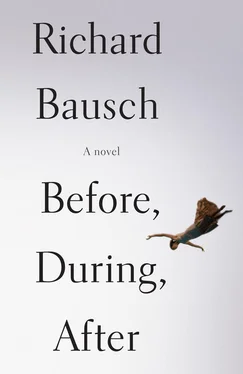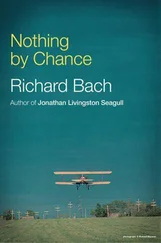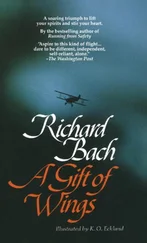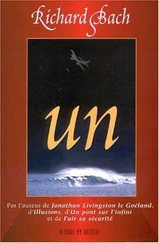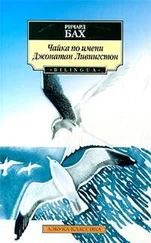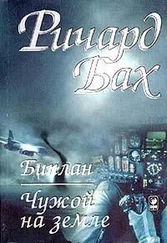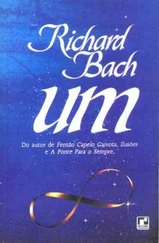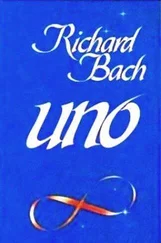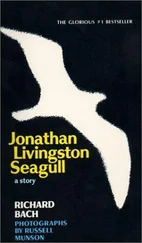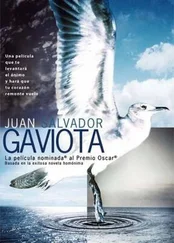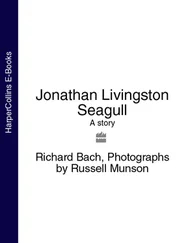“They hit D.C., too.” Theo began to cry. “The sons of bitches.”
“Is everybody all right?”
“We’re all going home. If you can get to Brooklyn, you know you’re welcome.”
“I’m gonna try for D.C.,” Faulk said. The other had hung up. He put another quarter in and tried to call Iris, Aunt Clara, and then Jamaica. Nothing was going through.
He went out and walked down the blocks, hearing the sirens, his head throbbing, the gritty air smelling of exhaust and drywall and plastic and, scarily, of jet fuel. All his training and all the years of practicing his vocation rose in him, and he looked for some way to help those he encountered on the street — but no one looked at him; they were all moving as if in a kind of severe blundering trance, northward.
4
It was impossible for Natasha to absorb what she saw as something really happening. She couldn’t think past the images on the television.
In the crowded lobby, people were lined up at the row of public phones, waiting to try calling relatives in the States. She saw several people with cell phones, but no one was having any success. There were six wall phones. The sixth was broken, the wire hanging from the silver cabinet without a receiver.
The phone lines to the United States were overloaded. But people kept trying. They kept redialing and putting money into the phones while the crowd waited behind them.
There was a movement to drive the twenty miles to Kingston, to try calling from there. Several people stepped forward, Natasha and Constance among them. They climbed into a van with three older women in shorts and blouses who wore big straw hats and sunglasses, a very heavy middle-aged man in a flowered Jamaican shirt, and a thin, ascetic-looking man in his thirties, whom none of them had seen before. The three women were together. They muttered back and forth about where they would sit, getting settled, and then they were still. Natasha saw the strands of red hair coming down over the ears of the nearest one. No one spoke. Ratzi drove. Constance was in the passenger seat in front; Natasha was in the middle seat, next to the window, the two other men on her right. The three ladies had jammed together in the far back. They were sniffling and murmuring to one another, and it sounded like a kind of whisper argument. Constance kept chewing her cuticles and sighing, staring out at the narrow road. She looked back at Natasha and repeated, “It doesn’t open until something like ten o’clock. I’m certain of it. He couldn’t have been in either building yet unless he worked there.”
One of the women in back, the one with the red hair, said, “I lived in New York for thirty-three years. Those buildings don’t open to the public until nine-thirty.”
“There,” Constance said. “See?”
“You have someone in New York?” the woman said to Natasha.
“Yes.”
“My whole family’s there. In Queens.” She sniffled. “My whole family. I’m so afraid for them. What else is going to happen?”
Ratzi turned the radio on, but it was all static. He kept turning the dial. It had been mostly static before, Natasha remembered, though it was difficult not to think of it as part of the catastrophe. Palm trees shaded the road thinly on both sides. There were mountains to the left. Through the palms to the right was the sea with its repeating foamy waves tumbling across the green surface and crashing ashore. The sight seemed unreal, pitilessly immaculate in the clarity of the sun. She felt sick to her stomach, looking at it, so beautiful, and it occurred to her that there was something ruthlessly insensible, blank, heartless, about the exquisite beach and every natural wonder out the window of the Jeep she and Constance rode in with the six silent others. Absurdly, she thought of the senator’s expansive back lawn and the little pleading statues.
Now the young man spoke. “It must have been the pilots. They must’ve infiltrated the pilot force.”
“Force?” Constance said.
“The roster of pilots,” said the heavy man in the flower-print shirt. He had his big hands folded across his belly. His eyes were red and shadowed, and the sclera were faintly yellow. The odor of alcohol came from him through strong cologne. He had a bulbous nose, with little red lines forking across the tip of it.
“Surely no one could force a pilot to do that to his own plane?” Ratzi said.
No one answered. The young man turned to Natasha. “My name is Nicholas Duego.”
Constance glared back at him from the front seat.
He shrugged and then muttered low, dispiritedly, as if it weren’t even worth saying, “We might as well know who we are.”
“You an American?” Constance asked.
“Cuban American.” His demeanor changed slightly. He was plainly buoyed by the question and felt the need to talk. “On my father’s side. I lived in Cuba. We went to Canada for a vacation when I was nine years old, and my father got us to Detroit. We moved to Orlando, Florida, when I was twelve. My father was a horse trainer. I did not speak English until I was ten.” Constance stared. There was a curious formality in his speech. No one else said anything, and after going on a little more he seemed to wind down, with a sort of sullen embarrassment. “We might as well know,” he muttered into the silence of the others.
On the outskirts of Kingston, houses and huts and shacks lined the road, teeming with Jamaicans, all going about the business of life in their native city. Children ran and played under the spray of water hoses, and there were many roadside stands selling goods — coffee, exotic fruits, vegetables, barrel-cooked meat and fish. The proprietors stared after the crowded car as it moved by into the busy stream of traffic, but people on the streets scarcely glanced at them. On the side of one building was a big painting of an imperial-looking black face superimposed on the form of a lion, with the phrase JAH RASTAFARI below it.
“What’s that?” said the heavy man.
“It’s a religion,” Ratzi said.
When they reached Kingston city center, they saw more roadside stands, including one built out of bamboo and containing bins of melting ice in which stood dozens of different kinds of bottled beer. They drove past a big crowded marketplace under a long bamboo roof. There were a lot of taxis — more than usual, it seemed. The Hilton was too crowded. Every American was trying to contact home. When Natasha finally got to a phone, the voice on the other end said all lines were busy. She tried her contact numbers for Faulk. His cell phone, the hotel. And she tried Iris, Aunt Clara. Nothing was getting through. Every circuit into the United States was over capacity. She went to one of the four televisions in the big orange-carpeted, palm-shaded lounge and watched with the others. She had missed the news about the fourth plane — the one in Pennsylvania — and she saw the reporting about that, and when the TV showed the flames and smoke still erupting out of the side of the Pentagon, she thought of all her friends on Capitol Hill. Constance had gone into the English-style pub and was watching the television there. She had ordered a drink. Natasha sat across from her and buried her face in her hands. “I’m numb. I can’t think.”
“You have to know I’m right,” Constance said. “He couldn’t have been there.”
“If I could just get through to him.”
“You heard the lady in the car.”
“I just want to talk to him and know he wasn’t anywhere near it.”
“I’ll get you a drink,” Constance said. “This is Campari and soda. You want one?”
“How can you drink?”
“Are you kidding? Look at this place.”
It was true. Everyone was drinking. The room was crowded, and everyone had something in hand.
Читать дальше
